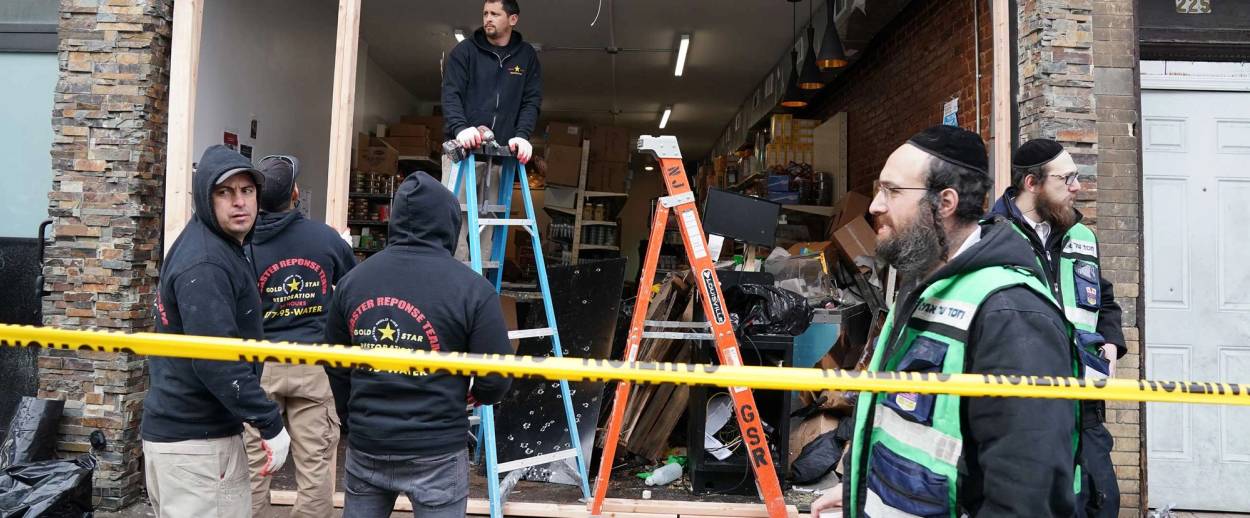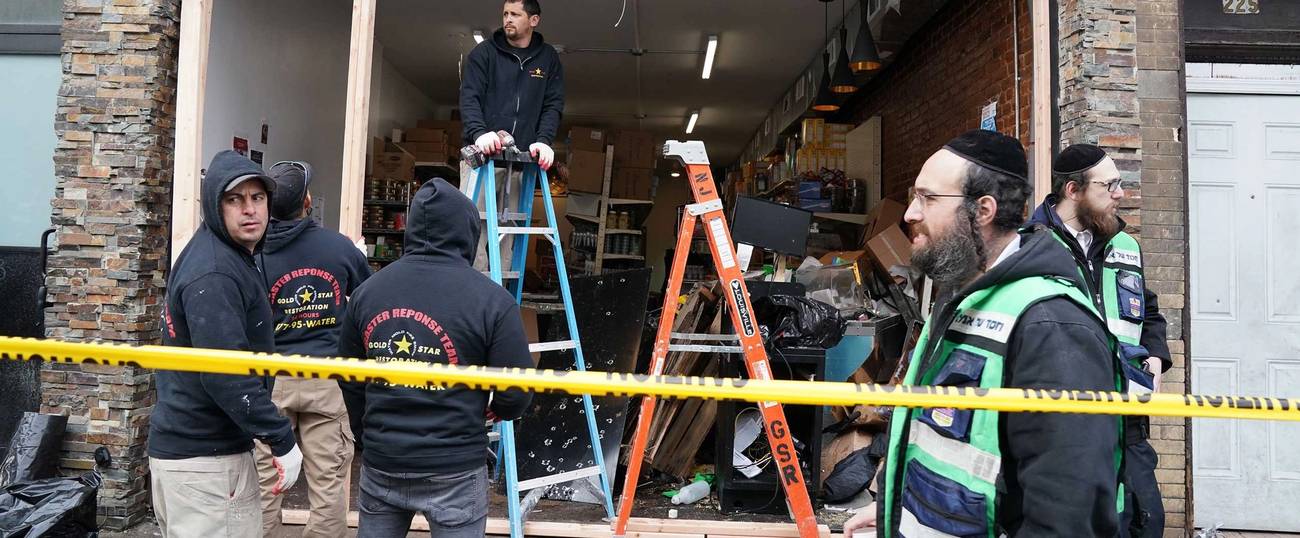Jewish Blood on the Streets of Jersey City
The targeted killing of two Jews in a kosher supermarket is only the latest incident in a slow-motion pogrom. And it could have been a lot worse.




Martin Luther King Jr. Drive between Bayview and Bidwell streets in Jersey City, New Jersey, is the kind of block that people in the New York area tend to idealize, one in which an astounding diversity of life is crammed into half the length of a football field. The JC Kosher Supermarket, where Moshe Hersh Deutsch, a yeshiva student, and Leah Mindel Ferencz, a 33-year-old mother and the store’s co-owner, were murdered yesterday by Black Hebrew gunmen who targeted the store, sits midblock between a synagogue and a tax preparer’s office. Farther down the block, a liquor store and the Reaching Out Deliverance Ministries share adjacent storefronts opposite a tranquil old Catholic school.
The JC Kosher Supermarket is Jersey City’s only kosher grocery store. It serves 100 or so families from the Satmar Hasidic group who live in the immediate neighborhood, where community members have moved over the past four years to escape skyrocketing property costs in Williamsburg, Brooklyn. Jersey City was a place where religious Jews could get everything they needed, a cheap and spacious foothold for whoever wanted out of Brooklyn but didn’t want to move too far from New York City.
The attack was waged on the heart of a young Jewish community. The attack’s two Jewish victims died within feet of the community’s main mikvah, which is a squat single-story addition protruding from behind the synagogue. A story below is a boy’s school where 57 young children were learning when the shooting started. If not for the quick intervention of multiple SWAT teams, the carnage in Jersey City would clearly have been even worse. As the attack continued, men on lockdown in the shul next door to the kosher supermarket recited psalms and prayed for a safe end to the crisis—the group reportedly included Leah Ferencz’s husband. On Wednesday morning, one could glimpse into the exposed storefront of the kosher supermarket and see what appeared to be containers of soup mandel as workers busily constructed a plywood barrier to shield the crime scene from both the elements and public view.
Local members of the Satmar community insist that they had never had any issues with their neighbors. “Good is an understatement—we get along with our neighbors very well,” said community leader Chesky Deutsch. More than one Satmar community member I spoke with pointed out that it was unknown whether the attackers, who appeared to belong to an extremist group of Black Hebrews, were locals.
Still, some of the locals who gathered around the crime scene on Wednesday had a slightly different view of things. “This neighborhood is not that great,” said Ali, a truck driver in his 60s. “There’s a lot of poverty. A lot of drugs here. The cops see people carrying guns, and sometimes they don’t want to arrest them.”
“The problem,” he continued, as we stood directly across the street from the grocery store’s blown-out facade, “is that the Jews are buying everybody out. This, I think, is revenge. It’s not a drug thing. They came for the Jews. All this property belongs to the Jews … they say it’s a hate crime, but later on you will know what’s going on.”
Jews, Ali alleged, were going around paying for houses in cash, on the spot, possibly as a kind of real estate speculation. “They’re looking like crazy for houses. This is gonna be like Hoboken one day, but we’re gonna be dead by then.”
Views like this were not hard to come by on Wednesday. Why had this attack happened? I asked Shawn, a local videographer. “Frustration. Poverty. It’s hard out here … I don’t have anything against them,” he continued, in reference to his Jewish neighbors, adding, almost apologetically, “but I’m not that into oppression.”
Chuck, who stood watching the scrum of emergency workers, media, and various Orthodox Jews from just behind the police line on MLK, had lived in the neighborhood for 11 years, one block away from the kosher grocery store and next door to an Orthodox Jewish neighbor with whom he said he got along very well. “There are a couple of things here and there, but it’s not that crazy,” he said of the neighborhood. “Whenever you hear about a shooting it’s always someone younger than 20.” The Jews had moved in over the previous three years. “It was the talk of the neighborhood—there, they bought that building, right there! They came as a tidal wave. They swooped in really quick.”
Later in the afternoon at the corner of MLK and Bayview, in front of the Catholic school and diagonal from the crime scene, a man in a paint-stained jumpsuit looked across the street at the JC Kosher Supermarket, which was now almost totally boarded up. He wasn’t a painter, but an ironworker from a neighborhood over who had taken the day off to make some repairs on his house. Fifteen years ago, he said, the area had been “pretty rough,” and then had actually worsened since then thanks to an influx of drugs and other criminal activity. By implication, the Jews’ arrival was a minor and seemingly positive development in comparison. Still, he didn’t seem to appreciate his neighbors.
“Not to knock anything about Jews, but they’re really not nice people, to me, personally,” he said. “Nobody bothers them. They stay to themselves. It’s kinda strange to be in an area with people who really don’t want to converse with you but want you to patronize their businesses.” Then, in the space of a second, the horror of the scene in front of him reasserted itself. “It really is sad,” he admitted, with whatever degree of reluctance. “Those lives lost.”
+++
The attack could have been unfathomably worse if not for the security precautions taken by the community. The synagogue next door to the grocery store has two entrances, both of which open into inner vestibules with a second door. Both of those doors would have been automatically locked from the outside at the time of the attack. The left entrance, which leads to a stairway to the school located on the two floors directly above the synagogue, has a self-locking analog keypad.
Had the attackers decided to shoot through either door, or if the doors had been open, the attackers could easily have taken dozens of young boys and their teachers hostage on the two upper floors, with only the front staircase offering a means of access or escape. The gunmen would also have been hidden behind a brick facade with only three fairly average-size windows offering exposure to the outside. A live pipe bomb was found inside a car linked to the assault. Presumably the attackers had plans to use it.
Compared to the school, the grocery store was a softer target, less secure and more public-facing than either the synagogue or the school. As one member of the Jewish community noted to me, “You put in Jewish places, it’s the first thing that pops up online.”
In the early afternoon, after the governor and mayor had come and gone, Rabbi David Niederman, the president of United Jewish Organizations of Williamsburg and one of the public faces of the city’s Satmar communities, arrived on the scene. I followed him and various leaders of the Jersey City community up that side stairway and into the first floor of the school, where dozens of children had been hiding in fear just a day earlier, and where a massacre beyond all imagination might have been narrowly avoided. There was a board game half out of its box, and cards strewn across one of the hallways. A single page of cursive Yiddish handwritten on notebook paper sat at my feet.
Niederman, who was likely in the midst of one of the most intense and complicated days of his life, had appeared at a press conference with New York Mayor Bill de Blasio just a couple hours earlier. He ate an egg salad sandwich and then said birkat hamazon under his breath.
Niederman had tirelessly sounded the alarm about the frequent attacks and harassment of Jews in Williamsburg. It was important for him to come to Jersey City as soon as he could, he said, because “my brother and my sister were killed here.”
In his experience, the attack was not a single, shocking incident of violence but rather the latest episode in a year-and-a-half-long period in which a Haredi Jew was hit, beaten, or threatened on the streets of New York on what felt like a monthly and then a weekly basis. That the steady drumbeat of attacks on Jews had finally turned deadly left him with a feeling of inevitability, exhaustion, and waste. “It’s incremental,” Niederman said of the worsening attacks. “The target moves.”
Niederman had a message for the non-Haredi Jews who form the vast majority of New York’s incredibly diverse Jewish community. “Don’t think that because you don’t have a kippa and you don’t dress like the Hasidim that you are safe,” he said. “Speak out, and say anti-Semitism has to be stopped, no matter who the recipient of the anti-Semitic acts are. Say: Those are our brothers and sisters. It’s our brothers and sisters, and people should start understanding that they are also Jewish, and therefore they can be next on the line.”
***
Like this article? Sign up for our Daily Digest to get Tablet magazine’s new content in your inbox each morning.
Armin Rosen is a staff writer for Tablet Magazine.